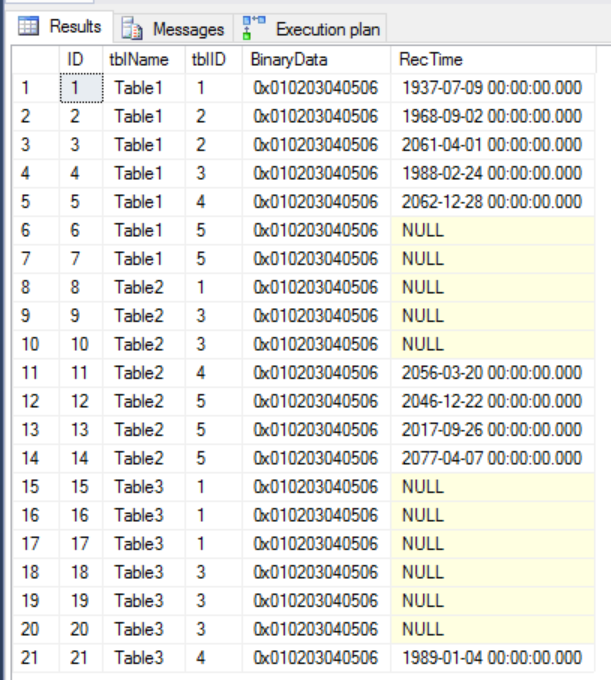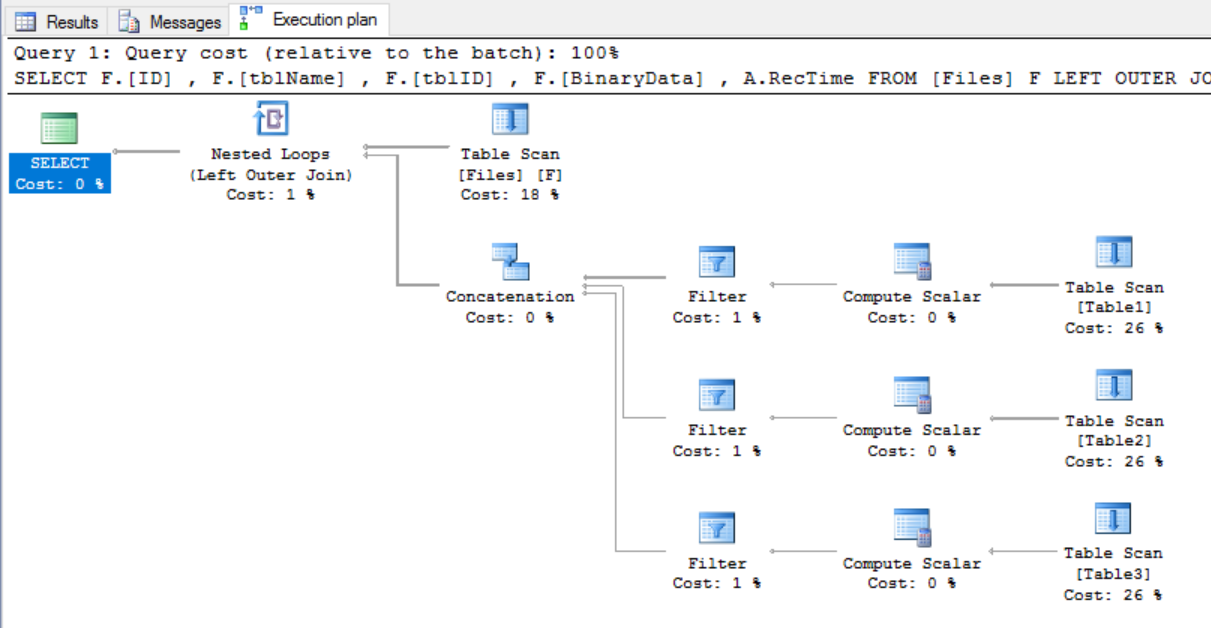Ι have some tables ( eg. [Table1], [Table2], [Table3] and so on ) with a [ID] as primary key and a RecTime as DATETIME on each.
Αlso Ι have a table [Files] that hold files in a varbinary(max) column, and refers to the other tables having their Names and IDs.
[Table2], [Table3] and others have different structure, but share the [ID] and [RecTime] column exactly as in [Table1]
Below is a quick sample to visualize data.
DECLARE @Table1 as table (
[ID] [bigint]
, [RecTime] [datetime]
)
DECLARE @Table2 as table (
[ID] [bigint]
, [RecTime] [datetime]
)
DECLARE @Table3 as table (
[ID] [bigint]
, [RecTime] [datetime]
)
DECLARE @Files as table (
[ID] [bigint]
, [tblName] nvarchar(255) NULL
, [tblID] bigint NULL
, [BinaryData] varbinary(max)
/* and some other columns */
)
INSERT INTO @Table1 (
[ID]
, [RecTime]
)
SELECT '1', DATEADD(day, (ABS(CHECKSUM(NEWID())) % 65530), 0)
UNION ALL SELECT '2', DATEADD(day, (ABS(CHECKSUM(NEWID())) % 65530), 0)
UNION ALL SELECT '3', DATEADD(day, (ABS(CHECKSUM(NEWID())) % 65530), 0)
UNION ALL SELECT '4', DATEADD(day, (ABS(CHECKSUM(NEWID())) % 65530), 0)
UNION ALL SELECT '5', DATEADD(day, (ABS(CHECKSUM(NEWID())) % 65530), 0)
INSERT INTO @Table2 (
[ID]
, [RecTime]
)
SELECT '11', DATEADD(day, (ABS(CHECKSUM(NEWID())) % 65530), 0)
UNION ALL SELECT '12', DATEADD(day, (ABS(CHECKSUM(NEWID())) % 65530), 0)
UNION ALL SELECT '13', DATEADD(day, (ABS(CHECKSUM(NEWID())) % 65530), 0)
UNION ALL SELECT '14', DATEADD(day, (ABS(CHECKSUM(NEWID())) % 65530), 0)
UNION ALL SELECT '15', DATEADD(day, (ABS(CHECKSUM(NEWID())) % 65530), 0)
INSERT INTO @Table3 (
[ID]
, [RecTime]
)
SELECT '21', DATEADD(day, (ABS(CHECKSUM(NEWID())) % 65530), 0)
UNION ALL SELECT '22', DATEADD(day, (ABS(CHECKSUM(NEWID())) % 65530), 0)
UNION ALL SELECT '23', DATEADD(day, (ABS(CHECKSUM(NEWID())) % 65530), 0)
UNION ALL SELECT '24', DATEADD(day, (ABS(CHECKSUM(NEWID())) % 65530), 0)
UNION ALL SELECT '25', DATEADD(day, (ABS(CHECKSUM(NEWID())) % 65530), 0)
INSERT INTO @Files (
[ID]
, [tblName]
, [tblID]
, [BinaryData]
)
SELECT '1', 'Table1', '1', 0x010203040506
UNION ALL SELECT '2', 'Table1', '2', 0x010203040506
UNION ALL SELECT '3', 'Table1', '2', 0x010203040506
UNION ALL SELECT '4', 'Table1', '3', 0x010203040506
UNION ALL SELECT '5', 'Table1', '4', 0x010203040506
UNION ALL SELECT '6', 'Table1', '5', 0x010203040506
UNION ALL SELECT '7', 'Table1', '5', 0x010203040506
UNION ALL SELECT '8', 'Table2', '11', 0x010203040506
UNION ALL SELECT '9', 'Table2', '11', 0x010203040506
UNION ALL SELECT '10', 'Table2', '12', 0x010203040506
UNION ALL SELECT '11', 'Table2', '13', 0x010203040506
UNION ALL SELECT '12', 'Table2', '14', 0x010203040506
UNION ALL SELECT '13', 'Table2', '12', 0x010203040506
UNION ALL SELECT '14', 'Table2', '15', 0x010203040506
UNION ALL SELECT '15', 'Table3', '21', 0x010203040506
UNION ALL SELECT '16', 'Table3', '22', 0x010203040506
UNION ALL SELECT '17', 'Table3', '24', 0x010203040506
UNION ALL SELECT '18', 'Table3', '23', 0x010203040506
UNION ALL SELECT '19', 'Table3', '25', 0x010203040506
UNION ALL SELECT '20', 'Table3', '25', 0x010203040506
UNION ALL SELECT '21', 'Table3', '21', 0x010203040506
SELECT * FROM @Table1
SELECT * FROM @Table2
SELECT * FROM @Table3
SELECT * FROM @Files
How can I join [Files] table to other tables, the Name and ID of which derive from a value in '[Files]' table ?
I need [BinaryData] from [Files] table and [RecTime] from respective table reference in [Files] table.
The real problem is that [Table1], [Table2] and [Table3] are not the only tables that are referred [Files] table. New tables can be created, for which binary data must be stored in [Files] table.
So I'm looking for a way to "join" them dynamically.
P.S. I'm not the creator of this system, and can not perform any structural change on it, but just trying to solve this problem.
Any help would be appreciated.



